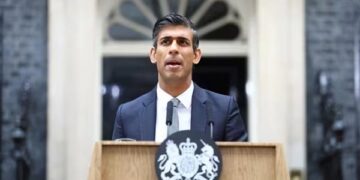In all my meetings, people were clear that they value Britain’s engagement. The UK’s voice matters. We have deep ties across the region—ties of defence, trade and investment, but also of history
The Prime Minister (Rishi Sunak)
MR Speaker, last week I visited the Middle East, bringing a message of solidarity with the region against terror and against the further spread of conflict. I met with the leaders of Israel, Saudi Arabia, Qatar, Egypt and the Palestinian Authority to co-ordinate our response to the crisis before us, but also to renew the better vision of the future that Hamas are trying to destroy.
I travelled first to Israel. It is a nation in mourning, but it is also a nation under attack. The violence against Israel did not end on October 7. Hundreds of rockets are launched at its towns and cities every day, and Hamas still hold around 200 hostages, including British citizens. In Jerusalem, I met some of the relatives, who are suffering unbearable torment.
Their pain will stay with me for the rest of my days. I am doing everything in my power, and working with all our partners, to get their loved ones home. In my meetings with Prime Minister Netanyahu and President Herzog, I told them once again that we stand resolutely with Israel in defending itself against terror…
I recognise that the Palestinian people are suffering terribly. Over 4,000 Palestinians have been killed in this conflict. They are also the victims of Hamas, who embed themselves in the civilian population. Too many lives have already been lost, and the humanitarian crisis is growing. I went to the region to address these issues directly. In Riyadh, and then Cairo, I met individually with Crown Prince Mohammed bin Salman from Saudi Arabia; the Amir of Qatar, Sheikh Tamim bin Hamad al-Thani; President Sisi in Egypt; and President Abbas of the Palestinian Authority. These were further to my meetings with the King of Jordan last week and calls with other leaders, and my right hon. Friend the Foreign Secretary’s extensive travel in the region.
There are three abiding messages from all these conversations. First, we must continue working together to get more humanitarian support into Gaza. The whole House will welcome the limited opening of the Rafah crossing. … We need a constant stream of aid pouring in, bringing the water, food, medicine and fuel that is so desperately needed, so we will keep up the diplomatic pressure. We have already committed £10 million of extra support to help civilians in Gaza, and I can announce today that we are going further…
We are also working intensively to ensure that British nationals trapped in Gaza are able to leave through the Rafah crossing when it properly reopens.
Secondly, this is not a time for hyperbole and simplistic solutions. It is a time for quiet and dogged diplomacy that recognises the hard realities on the ground and delivers help now, and we have an important role to play. In all my meetings, people were clear that they value Britain’s engagement. The UK’s voice matters. We have deep ties across the region—ties of defence, trade and investment, but also of history.
Thirdly, growing attacks by Hezbollah on Israel’s northern border, rising tensions on the west bank, and missiles and drones launched from Yemen show that some are seeking escalation, so we need to invest more deeply in regional stability and in the two-state solution. Last night, I spoke to the leaders of the United States, Germany, France, Italy and Canada. We are all determined to prevent escalation …
Mr Speaker, Hamas care more about their paymasters in Iran than the children they hide behind. So let me be clear: there is no scenario where Hamas can be allowed to control Gaza or any part of the Palestinian territories. Hamas is a threat not only to Israel, but to many others across the region…
I also want to say a word about the tone of the debate. When things are so delicate, we all have a responsibility to take additional care in the language we use, and to operate on the basis of facts alone. The reaction to the horrific explosion at the Al-Ahli Arab Hospital was a case in point. As I indicated last week, we have taken care to look at all the evidence currently available, and I can now share our assessment with the House. On the basis of the deep knowledge and analysis of our intelligence and weapons experts, the British Government judge that the explosion was likely caused by a missile, or part of one, that was launched from within Gaza towards Israel. …
We have seen hate on our streets again this weekend. …Calls for jihad on our streets are a threat not only to the Jewish community but to our democratic values, and we expect the police to take all necessary action to tackle extremism head on.
This a moment for great care and caution, but also for moral clarity. Hope and humanity must win out against the scourge of terrorism and aggression. … Putin will fail, and so will Hamas. We must keep alive that vision of a better future, against those who seek to destroy it. Together with our partners, that is what we will do, and I commend this statement to the House.
















